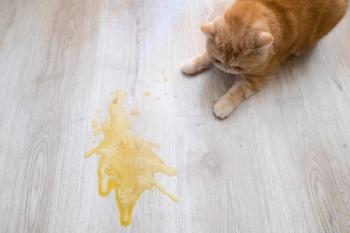
CaliciVax updated to cover virulent system feline calicivirus
Orlando, Fla.- Fort Dodge Animal Health reports it received licensure of CaliciVaxâ„¢, the only vaccine licensed and proven effective against the deadly virulent systemic feline calicivirus (VS-FCV), which has emerged in the United States.
ORLANDO, FLA.— Fort Dodge Animal Health reports it received licensure of CaliciVax™, the only vaccine licensed and proven effective against the deadly virulent systemic feline calicivirus (VS-FCV), which has emerged in the United States.
Since its identification in Northern California in 1998, the virus has been reported in clinics and shelters nationwide.
VS-FCV, a highly contagious mutation of the traditional calicivirus (FCV), has a significantly higher mortality rate than traditional calicivirus. In some cases, death occurred within 24 to 48 hours, even in cats previously vaccinated with a traditional FCV vaccine.
Signs of the virus infection can include high fever, facial and limb edema, ulceration and hair loss, especially on the face, muzzle and feet, as well as signs frequently seen in association with the common FCV strain, including nasal and ocular discharge, oral ulceration, anorexia and depression.
CaliciVax contains a VS-FCV strain, as well as the traditional strain of FCV, which allows for broad cross-protection. The product has been proven effective under severe challenge with no vaccinated cats showing clinical signs consistent with VS-FCV.
CaliciVax also is proven safe through a study of more than 1,400 doses administered to client-owned cats from six veterinary practices.
Similar to traditional calicivirus, VS-FCV is easily transmitted from cat to cat through infected ocular and nasal secretions. VS-FCV can also spread readily via fomites such as hands, clothing, tables, doorknobs and shoes.
Because of the ease of transmission, VS-FCV poses a major threat to veterinary practices – even when aggressive hygienic precautions are taken. A confirmed case of VS-FCV requires rigorous decontamination and isolation of exposed cats for weeks.
"If this disease occurs in practice, it may result in problems and frustrations for weeks to come," says Gary D. Norsworthy, DVM, Dipl., ABVP (Feline Specialty). "Various measures have been recommended to try to stop its spread, including disinfecting every touched surface in the hospital. This even includes doorknobs, keyboards and telephones. Some have even considered closing for up to two weeks, which would obviously be devastating in many ways for a practice and its employees."
Newsletter
From exam room tips to practice management insights, get trusted veterinary news delivered straight to your inbox—subscribe to dvm360.





